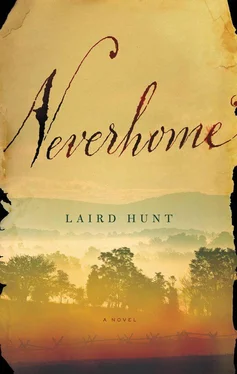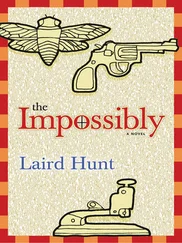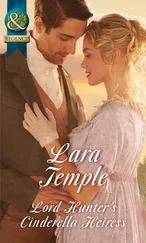“You see any blood in these eyes I’m looking at you with?” I asked the sheriff when he was done telling me everything I already knew.
“You have had quite a shock and look road-weary and I will see to your husband’s arrangements if you like, madam,” is what he said.
“I killed them all, every one, even my Bartholomew,” I said.
“You will want to rest up now, Mrs. Thompson,” said the sheriff. “I will have a buckboard take you back home.”
“Take who home? There’s more than one of me here,” I said.
Before Bartholomew breathed his last I let his head down soft onto the dirt floor of the barn and I went out to the edge of the south field and climbed the ash tree where my mother had hung herself and where I had found her swinging on the last day of my youth. I climbed it and felt for the notch just above the branch where she had tied her rope. In the notch was an oilskin bag and in the bag was the deed to my farm. I brought the deed down out of the tree and I carried it into the barn.
“You want to sell, we’ll sell, there’s other buyers in the world,” I said to my Bartholomew. “We can move off away elsewhere. Make a new start. Try for a family together again.”
But he was already dead.

Not so long ago I was coming back from a trade show and passed a greenhouse made of glass from photographic plates. It was bigger but not better built than Weatherby’s, and it had been made along the same lines. This one had been standing some time when I saw it and all that was left of what the glass had shown was smudges of gray, swirls of brown. The woman had the greenhouse said it was a company out of Pennsylvania had built it for her. She said it had been pretty when they had put it up and the images had given off just the right speck of shade but now the sun had had its way and all the ladies and soldiers she had liked to look at were gone. I got the name of the company before I left and wrote them when I got home but they had gone out of business and said they couldn’t help me.
It took me a while but I tracked down three plates of that kind of glass in a likeness shop over in Lafayette and put them in our kitchen window here on the farm. Two fine ladies and one man. Spring and summer, the morning light catches them there, lights them each a minute out of their darkness, lets them glow. One morning these past weeks, as I was looking at them, there was a knock on my door. It was a woman dressed in plain clothes and scuffed shoes about my age had come to pay me a call. She had dust on her from the road and when I asked her she told me she was up from near Yellow Springs, Ohio, so I let her in. We drank hot tea at the kitchen table next to the fading pictures. She was housekeeper to a friend of the General and his wife and at one of the dinners she had helped serve, she had heard a story about a woman had fought for the Union army under the General’s command.
“He was a colonel when I fought for him,” I said.
“I did some soldiering myself, or a kind of it,” she said.
I looked a long while at her and she at me. I had never met another since that time on the road with the colored woman had put her knee to my chest, and I had wondered about it, like I expect all of us had put on pants and gone to war did.
“What made you go?” I said, facing away from her.
“There was two of us,” I heard her say. “It was the other one of us put on the colors. I just kind of rode along.”
“Do you smoke a pipe?” I said.
She said she did and we stepped outside and sat on my front steps and smoked a pipe and traded stories of our adventures in the war. I spoke first and said not very much at all, though it seemed to satisfy her. When it came her turn she told me that her name during the war had been Leonidas and that her friend’s name had been Leander. Leonidas and Leander had been together through the whole long days of the fight.
“We had started out,” she told me, “hauling wood and tending stock and working in the fields in place of all the boys who had gone. When we got tired of that and of our harping parents, we followed after them and saw the bullets fly and heard the cannons roar. We went out onto the fields after the fighting and walked among the dead men and helped take them to their graves. We saw the surgeries where the men were brought to have their limbs removed. We watched them chop a boy’s leg off and throw what they took straight out the front door.”
Dressed in pants, she said, they had attended a battle, and when it went bad and they had killed up most of our side, Leander had put on a dead boy’s uniform and took up his firearm and marched away barefoot with the rest of them. Leonidas had followed Leander through all the weeks and months that followed and even though she had not worn a uniform she had many a time lifted up pistol or rifle and brought the hammer down. After one battle, Leander had got thrown in a prison camp and starved and fooled with and beat for kicking in the teeth of the someone who had fooled with her. Leonidas had met Leander at the gate when they got tired of her troublemaking and set her free.
“She wouldn’t speak a word when she left that evil place and so we walked the roads until she one day got her voice back. ‘Now, that was something and, goddamn, that was something, and goddamn all of it to hell’ is what she said.”
Leander had made this comment as they were walking through a pine forest. Every step in that forest had lifted up something soft and special to smell. You could, Leonidas told me as we sat smoking on my steps, have just laid down on that ground and gone right to sleep or died.
“But we didn’t die yet and there we went a-walking. We turned a corner and come upon a pool of water. When we stepped up close to drink we saw it was shallow and full of dead crickets. Leander looked at those crickets and the tears came climbing up. ‘Every one of them is dead,’ she said. We cried and cried.”
As they were returning home at last by paddleboat, Leander was taken by a fever and had joined the crickets, along with a number of others. The paddleboat captain, fearing further infection, had organized a burial party on a sandbar. Leonidas had tried as best she could to mark the spot but when she returned some while later she found nothing of her friend but the wide waters of the river. As for her subsequent life without Leander she remarked, “I made it back, sure enough, but never felt I’d made it home.”
In the days following this visit, which ended very soon after those last words, I wrote a letter down to Yellow Springs, to the General, to tell him that it was true that I had stolen food out of haversacks, that I was sorry for it and did not know why I had done it and wished I could put all that food I had stolen and eaten back. That maybe things would have turned out different and for the better if I had done so. Leonidas had asked me not to speak of her in any communication with the General, so instead I asked after Weatherby and Weatherby’s grandson and the General’s wife and told the General to send them all my regards.
My husband was long since deceased, I wrote him. By my own hand. I had seen him garbed but not disguised in cloak and hat and climbing up the ladder carrying my mother’s musket, and I had grown frightened — of what had been and what was there — and had seen him in my mind’s eye taking aim at me with it, even though he had not taken aim at me, and I had shot him.
He comes to me sometimes, I wrote. He comes and sits with me at my table or stands in my doorway after I’ve had one of my bad dreams or goes walking out on some business across the yard. I try to talk to him but he will not talk to me. Only sits or stands there. Not all things disappear quickly.
Читать дальше













